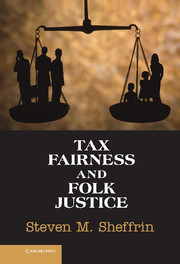Book contents
- Frontmatter
- Dedication
- Contents
- Preface
- Glossary of Terms in Psychology, Philosophy, and Economics
- 1 Approaching Tax Fairness
- 2 The Foundations of Folk Justice
- 3 Fairness and the Property Tax
- 4 Should We Redistribute Income through Taxation?
- 5 Why Do People Pay Taxes?
- 6 Desert, Equity Theory, and Taxation
- 7 Concluding Perspectives
- Bibliography
- Index
1 - Approaching Tax Fairness
Published online by Cambridge University Press: 05 July 2013
- Frontmatter
- Dedication
- Contents
- Preface
- Glossary of Terms in Psychology, Philosophy, and Economics
- 1 Approaching Tax Fairness
- 2 The Foundations of Folk Justice
- 3 Fairness and the Property Tax
- 4 Should We Redistribute Income through Taxation?
- 5 Why Do People Pay Taxes?
- 6 Desert, Equity Theory, and Taxation
- 7 Concluding Perspectives
- Bibliography
- Index
Summary
The United States and other mature economies face persistent fiscal problems. The combination of aging populations, increasing demand for health care in the face of rising costs, and commitments toward equality of educational opportunities all outstrip the apparent willingness of the public to levy taxes to pay for these goals. Matching desired expenditures to desired taxation is naturally a difficult political challenge, as it forces the politicians and the public to decide what they really want and what they are willing to sacrifice to obtain it. One should not expect that weighing costs versus benefits in complex settings would ever be easy – or pretty. Making these challenges even more difficult are the questions that swirl around the “fairness” of taxes. Tax fairness embraces a variety of diverse questions and issues: what types of taxes should be levied, who should pay them, how they should be administered, and what processes should be used to make these decisions?
It is tempting to think that tax fairness can be analyzed with a separate set of tools and concepts specifically and narrowly tailored to debates about public finance, but the reality is quite different. Philosophers, economists, psychologists, lawyers, and tax theorists have all discussed tax fairness from very different perspectives. What emerges from this vast literature is that tax fairness needs to be seen as part of a broader discussion of fairness and justice. It cannot be relegated simply to questions that narrowly arise in public finance. Complicating the matter even further is that strong views on tax fairness are also held by the general public. These views are often quite distinct from those held by tax policy theorists. Whose views should prevail?
- Type
- Chapter
- Information
- Tax Fairness and Folk Justice , pp. 1 - 27Publisher: Cambridge University PressPrint publication year: 2013



